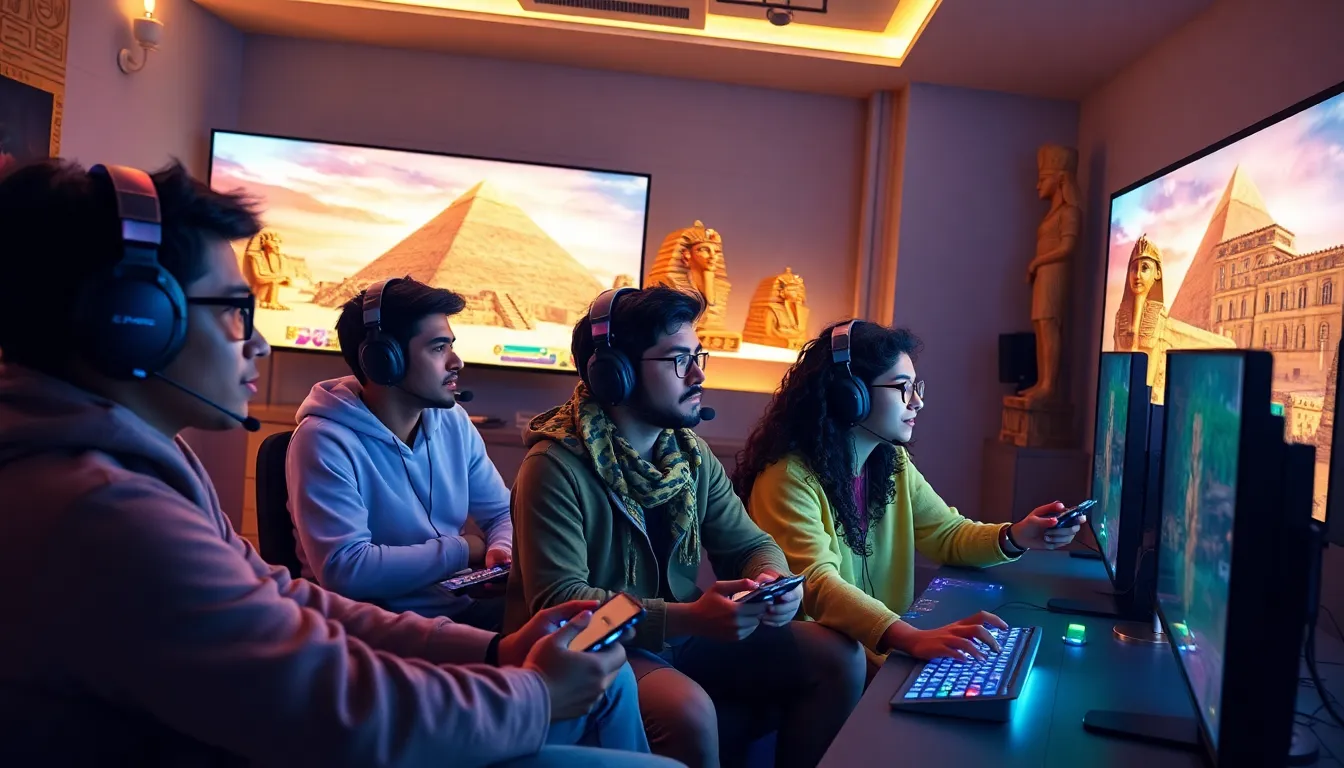Table of Contents
ToggleIf you’ve ever found yourself wandering through the sun-drenched deserts of Egypt or deciphering cryptic hieroglyphs, chances are you’ve been bitten by the gaming bug that is ancient Egypt. It’s a world filled with towering pyramids, mystical deities, and enough secrets to make Indiana Jones jealous. In this exploration of ancient Egyptian lore in gaming, we’ll unravel the layers of history, art, and culture that make this theme endlessly appealing. Grab your virtual shovels, you won’t want to miss out on this treasure trove of insights.
The Allure Of Ancient Egypt In Gaming

Historical Context And Accuracy
The fascination with ancient Egypt often starts with its rich and enigmatic history. From the reign of Pharaohs to the construction of the Great Pyramid, the timeline spans millennia of accomplishments and mysteries. Games engross players in this historical narrative, sometimes with painstaking accuracy, showcasing stunning architectural marvels and intriguing societal structures. Yet, while many titles strive for historical realism, a splash of creative license often fuels the most engaging stories. This balancing act keeps players immersed and entertained, blending fact and fiction seamlessly.
Cultural Significance Of Ancient Egyptian Lore
The cultural tapestry of ancient Egypt, filled with tales of gods, pharaohs, and the afterlife, adds depth to gaming experiences. Players are often drawn into epic sagas inspired by mythological elements, providing not just entertainment but also a connection to a civilization that thrived thousands of years ago. The interplay of myth and reality in games allows for both learning and escapism. Individuals don’t just play: they step into a narrative that resonates with their sense of adventure and exploration.
Iconic Games Featuring Ancient Egypt
Exploring The Tomb Raider Series
No discussion of gaming’s take on ancient Egypt would be complete without mentioning Lara Croft and her thrilling escapades.
The Tomb Raider series has consistently featured archaeological wonders brought to life with breathtaking detail. Players navigate vast tombs filled with intricate puzzles and traps, all while piecing together stories of a long-lost civilization. The combination of treasure hunting and ancient lore captivates gamers, drawing them deeper into complex narratives and engaging environments.
Immersive Experiences In Assassin’s Creed Origins
Assassin’s Creed Origins takes players on a journey through Egypt during its Ptolemaic period. The open-world design allows for expansive exploration, providing a taste of life in ancient times. Players can uncover hidden treasure, interact with historical figures, and even engage in combat while reveling in the beauty of the Nile and the sprawling landscapes. The meticulous attention to detail, from architecture to ambient sounds, elevates the experience, making it more than just a game, it’s a historical adventure.
The Art And Aesthetics Of Ancient Egypt In Games
Visual Representation And Design Choices
Art and design play a pivotal role in portraying ancient Egypt within games. Bright colors, hieroglyphs, and iconic monuments bring this ancient world to life. Developers often draw inspiration from artifacts, utilizing textures and layouts that reflect the era’s artistic styles. This meticulous attention to detail not only enhances the visual experience but also provides authenticity, ensuring players can fully appreciate the beauty and grandeur of this civilization.
Symbolism And Iconography In Game Worlds
Symbolism is deeply entrenched in ancient Egyptian culture, as many gods and rituals are steeped in meaning. Games often incorporate this symbolism thoughtfully, which allows players to explore deeper narratives beyond surface-level gameplay. Whether navigating a quest involving Anubis or performing rituals related to the afterlife, these elements connect players to the ancient belief systems, offering enriching experiences layered with context and intrigue.
The Impact Of Ancient Egyptian Themes On Game Mechanics
Puzzle Solving And Exploration Dynamics
Exploration is at the heart of games set in ancient Egypt, where players investigate into tombs and ancient ruins. Puzzle mechanics inspired by real-life Egyptian artifacts compel gamers to engage actively with their surroundings. By deciphering clues and overcoming obstacles, players not only progress but also experience rewarding moments of discovery reminiscent of archaeological digs. This aspect highlights the importance of curiosity, making each uncovering an exhilarating try.
Character Development Rooted In Ancient Myths
Character development often reflects ancient narratives, encouraging players to grow alongside their digital avatars. Characters inspired by ancient Egyptian figures face trials echoing mythological tales, whether it’s embarking on a quest for immortality or battling formidable gods. This connection deepens the gameplay experience, as players become invested not just in winning but in understanding their character’s journey, reminiscent of the epic tales etched in history.
Community Engagement And Reception
Fan Theories And Speculations
Gamers are notoriously creative when it comes to crafting theories about their favorite titles. Ancient Egypt, with its myriad of mysteries, provides fertile ground for speculation. Forums and online communities buzz with discussions about hidden meanings, secret codes, and alternative endings. This interaction elevates the gaming experience, fostering a sense of community while allowing fans to grapple with their interpretations of ancient lore.
Cultural Appreciation Vs. Appropriation
As games continue to explore ancient Egyptian themes, conversations about cultural sensitivity surface. Gamers and developers alike navigate the fine line between appreciation and appropriation. Many titles aim to honor the rich heritage of ancient Egypt, yet others face criticism for misrepresentation or oversimplification. Acknowledging this dynamic is critical, ensuring that engagement with ancient cultures promotes learning rather than perpetuating stereotypes.





